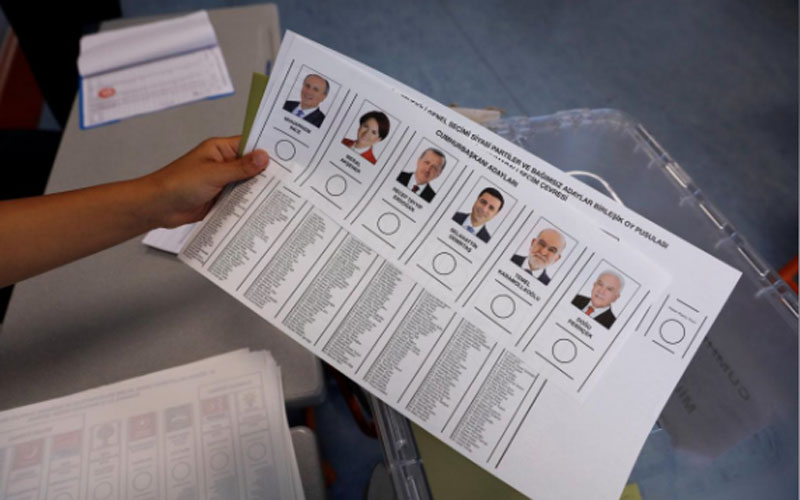Erdogan, ruling AK Party take lead in Turkish elections
05/07/2018

Tayyip Erdogan and his ruling AK Party took an early lead in presidential and parliamentary elections on Sunday, according to preliminary partial results, boosting the presidents hopes of extending his 15-year rule.
However, the first results had been expected to give Erdogan and his Islamist-rooted party a strong lead and it is expected to shorten as more votes are tallied across the nation of 81 million people.
With about 30 percent of votes counted in the presidential race, Erdogan had 58 percent, well ahead of his closest rival, Muharrem Ince, of the main opposition, secularist Republican Peoples Party (CHP), on 27.5 percent, broadcasters said.
If no presidential candidate wins more than 50 percent in Sundays vote, a second round run-off will be held on July 8.
In the parliamentary contest, the AK Party had 53.03 percent, based on 10.25 percent of votes counted, the broadcasters said. The CHP had 14.82 percent and the pro-Kurdish Peoples Democratic Party (HDP) 7.07 percent.
Turnout was high at around 87 percent for both contests, the state broadcaster said.
Sundays vote ushers in a powerful new executive presidency long sought by Erdogan and backed by a small majority of Turks in a 2017 referendum. Critics say it will further erode democracy in the NATO member state and entrench one-man rule.
Earlier on Sunday, a crowd of Erdogans supporters chanted his name as he emerged from a school after voting in Turkeys largest city Istanbul, shaking hands with people amid tight security.
“Turkey is staging a democratic revolution,” he told reporters in the polling station. “With the presidential system, Turkey is seriously raising the bar, rising above the level of contemporary civilizations.”
Erdogan, the most popular but also divisive leader in modern Turkish history, argues the new powers will better enable him to tackle the nations economic problems - the lira has lost 20 percent against the dollar this year - and deal with Kurdish rebels in southeast Turkey and in neighboring Iraq and Syria.
But he reckoned without Ince, a former physics teacher and veteran CHP lawmaker, whose feisty performance at campaign rallies has galvanized Turkeys long-demoralised and divided opposition.
Voicing opposition concerns about possible electoral fraud, Ince told reporters outside the High Electoral Board (YSK) after polling stations had closed that citizens should protect ballot boxes. He also urged YSK members to “do your job the right way”, adding he believed the results would be “very good”.
Opposition parties and NGOs deployed up to half a million monitors at ballot boxes to ward against fraud. They have said election law changes and fraud allegations in the 2017 referendum raise fears about the votes fairness.
Erdogan said there had been no serious voting violations.
Turkey has been under emergency rule - which restricts some freedoms and allows the government to bypass parliament with decrees - for nearly two years since an attempted coup in 2016.
Erdogan blamed the coup on his former ally, U.S.-based Muslim cleric Fethullah Gulen, and has waged a sweeping crackdown on his followers in Turkey, detaining some 160,000 people, according to the United Nations.
The presidents critics, including the European Union which Turkey still nominally aspires to join, say Erdogan has used the crackdown to stifle dissent.
Ince told a rally on Saturday he would lift the state of emergency within 48 hours of being elected president. He also vowed to reverse what opposition parties see as Turkeys swing towards authoritarian rule under Erdogan.
“This is no longer a Turkey we want. Rights are violated, democracy is in terrible shape,” said health sector worker Sema, 50, after voting in Istanbul.
She and others in the city said they voted for the pro-Kurdish HDP, hoping it would exceed the 10 percent threshold of votes needed to enter parliament. If it does so, it will be harder for the AKP to get a majority.